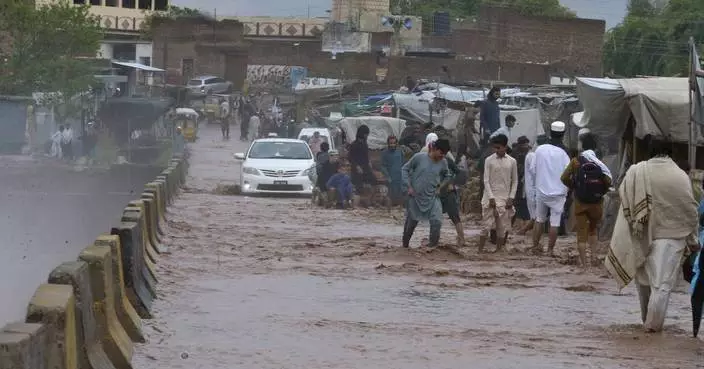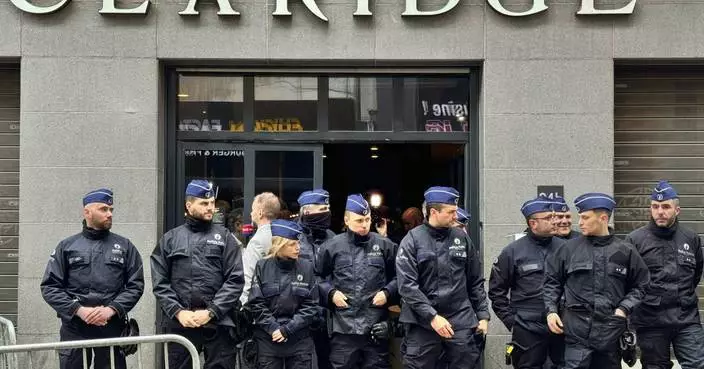George Skipper was in a hurry.
Having overslept, the D-Day veteran gunned his mobility scooter across the quad at the Royal Hospital Chelsea, the tail of his scarlet coat flapping as he raced to an interview about the Allied landings in Normandy. He just missed a historic cannon, but splinters flew when he misjudged the width of a doorway. A hospital official urged him to slow down, but he pressed on.
Click to Gallery
George Skipper was in a hurry.
"I lost two of my best friends in it, they got killed," Skipper, now 96, told The Associated Press during an interview at the historic home for retired soldiers. "We lost a hell of a lot of men on D-Day, hell of a lot of men. But then again, when you come to think of it, when the war was on, life was very cheap for the soldiers. They were getting killed left, right and center."
This year, Skipper is going back on a specially chartered ship for Normandy veterans. It won't be the first trip for many of them, as some go every year. But Skipper says this year is special. If nothing else, because people are listening to his story.
It was not long after that air raid sirens became the norm, their two-tone wail warning Londoners to take shelter.
In May 1944, he got two days off and married his fiancee, June, a member of the Women's Auxiliary Air Force who helped service barrage balloons. The reception featured four quarts of brown ale and lettuce sandwiches in his mother's living room.
The soldiers were ordered to jump out into water their officers believed was knee deep. But an unseen bomb crater meant the heavily-laden infantrymen couldn't touch bottom.
Seventy-five years after Skipper splashed ashore on Gold Beach, the former working-class lad from London's East End is still doing his duty. These days, it's reminding younger generations about the sacrifices of those who didn't come back.
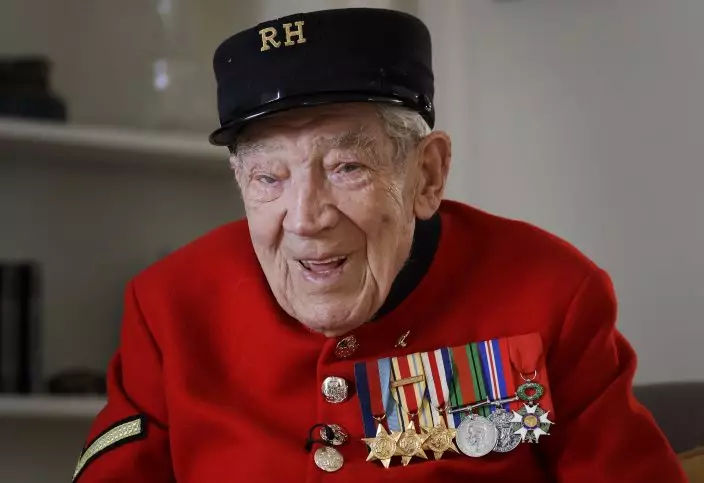
In this May 7, 2019, photo, Chelsea Pensioner and D-Day veteran George Skipper speaks during an interview with Associated Press at the Royal Hospital in Chelsea, London. While the anniversary provides a welcome platform for Skipper, it's also hard on him. He wonders why he survived and others didn't. (AP PhotoKirsty Wigglesworth)
"I lost two of my best friends in it, they got killed," Skipper, now 96, told The Associated Press during an interview at the historic home for retired soldiers. "We lost a hell of a lot of men on D-Day, hell of a lot of men. But then again, when you come to think of it, when the war was on, life was very cheap for the soldiers. They were getting killed left, right and center."
With the number of survivors dwindling every year, men like Skipper are on a mission to share their experiences —aware that this is probably the last big anniversary of their lifetimes.
About 160,000 British, American and Canadian troops landed on the beaches on June 6, 1944, with more than 2 million taking part in the campaign before Allied forces broke out of Normandy and started their march to Paris to take back occupied France. Almost 73,000 Allied troops were killed.
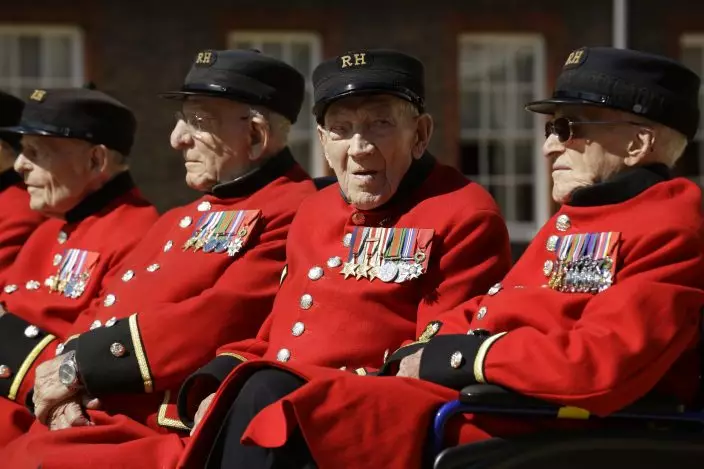
FILE - In this May 13, 2019, file photo, British Chelsea Pensioners who are veterans of the World War II Battle of Normandy, codenamed Operation Overlord, and D-Day pose for a group photograph during a D-Day 75th anniversary event at the Royal Hospital Chelsea in London, Monday, May 13, 2019. The 75th anniversary of D-Day is on June 6. Pictured from left: Ernie Boyden, Frank Mouque, George Skipper and Arthur Ellis. (AP PhotoMatt Dunham, File)
This year, Skipper is going back on a specially chartered ship for Normandy veterans. It won't be the first trip for many of them, as some go every year. But Skipper says this year is special. If nothing else, because people are listening to his story.
Skipper was just 16 when the war broke. He'd grown up so poor that he shared a bed with three siblings and would pick bread off the ground and soak it in water to soften it, so he could eat it. His father was often drunk. His mother would scrub down ships on the docks to keep the family alive. Even as a kid, took odd jobs and loaded Johnnie Walker whisky on horse-drawn carts.
He was playing cards at home with his brother when Prime Minister Neville Chamberlain came on the radio, telling the nation that Britain would declare war if Adolf Hitler didn't leave Poland.
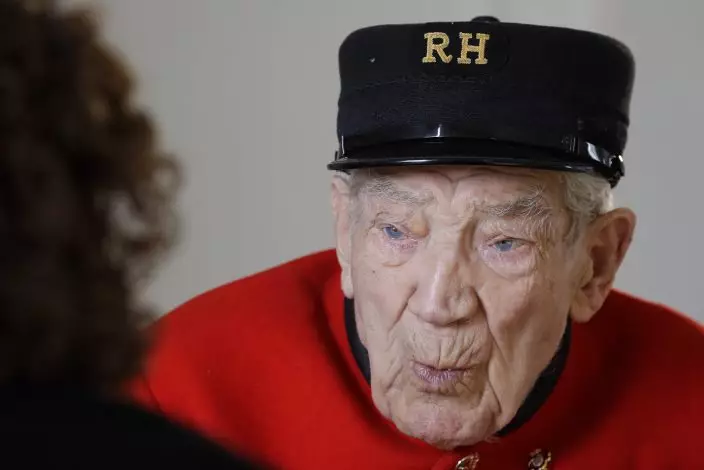
In this May 7, 2019, photo, Chelsea Pensioner and D-Day veteran George Skipper speaks during an interview with The Associated Press at the Royal Hospital in Chelsea, London. Skipper said he wants to keep returning to Normandy for as long as he is able, even if he's the only one. He worries that the world, and young people in particular, have forgotten what happened on D-Day. (AP PhotoKirsty Wigglesworth)
It was not long after that air raid sirens became the norm, their two-tone wail warning Londoners to take shelter.
A champion boxer and dancer, Skipper was called up for active duty with the Royal Army Service Corps when he was 18. He'd never been farther than the farms of Kent, south of London, before the Army sent him to North Africa where he spent 14 months with Field Marshal Bernard Montgomery's famed Desert Rats.
Returning to Britain in the buildup to D-Day, Skipper found himself chauffeuring colonels and generals around London. He knew the city, which could be difficult to navigate in blackout conditions, and recognized that his passengers appreciated a polished appearance. He figured out a way to keep his trousers creased and his boots shiny.
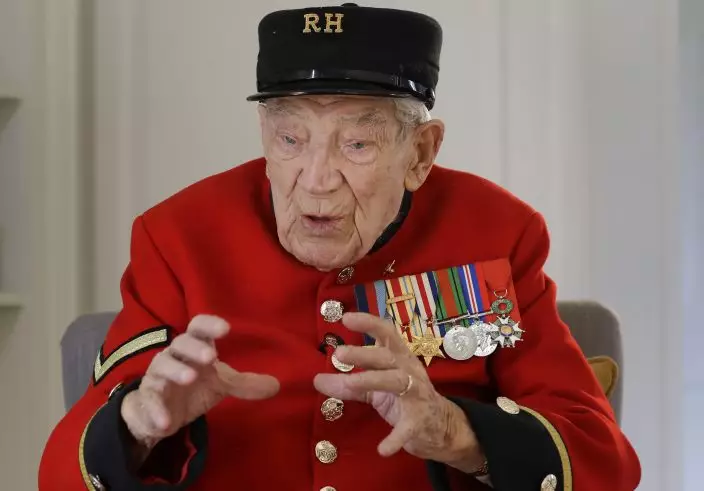
In this May 7, 2019, photo, Chelsea Pensioner and D-Day veteran George Skipper speaks during an interview with The Associated Press at the Royal Hospital in Chelsea, London. Seventy-five years after Skipper splashed ashore on Gold Beach, he is still doing his duty. These days, it’s reminding younger generations about the sacrifices of those who didn't come back. (AP PhotoKirsty Wigglesworth)
In May 1944, he got two days off and married his fiancee, June, a member of the Women's Auxiliary Air Force who helped service barrage balloons. The reception featured four quarts of brown ale and lettuce sandwiches in his mother's living room.
One week later, Skipper found himself at London's Victoria Docks boarding the ship that took him to Normandy.
"It all happened so quickly," he recalled. "We were on a boat that took us inland and (then) we jumped over onto a flat-bottomed boat and in we went."
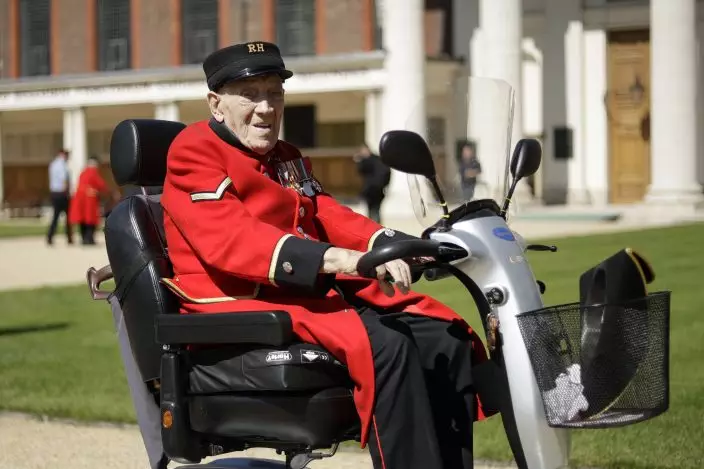
In this May 13, 2019, photo, British Chelsea Pensioner and D-Day veteran George Skipper, who served in the British Royal Army Service Corps drives away after posing in a group photograph during a D-Day 75th anniversary event in the State Apartments at the Royal Hospital Chelsea in London. With the number of survivors dwindling every year, men like Skipper are on a mission to share their experiences. (AP PhotoMatt Dunham)
The soldiers were ordered to jump out into water their officers believed was knee deep. But an unseen bomb crater meant the heavily-laden infantrymen couldn't touch bottom.
Skipper could swim, but others couldn't. After urging his comrades to pretend they were "jumping on their toes," he swam to shore, threw off his pack and came back to help the others.
"I got back and pushed them in," he said. "They said you would get a medal for this ... (but) all I got was soaking wet."
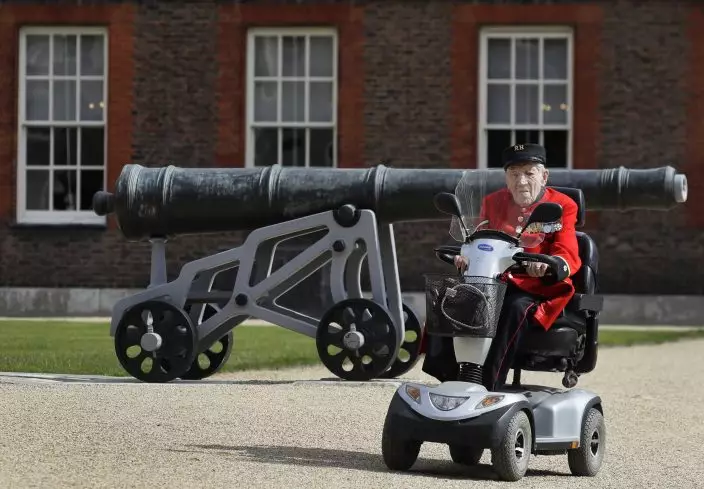
In this May 7, 2019, photo, Chelsea Pensioner and D-Day veteran George Skipper arrives on his mobility scooter for an interview with The Associated Press at the Royal Hospital in Chelsea, London, Tuesday, May 7, 2019. With the number of survivors dwindling every year, men like Skipper are on a mission to share their experiences. (AP PhotoKirsty Wigglesworth)
The beach was chaos. German bombers overhead, machine guns rattling, dead bodies in the water, hundreds of boats delivering men and equipment to the beach, soldiers shouting "Come on!"
Skipper said he survived because he just kept going.
"When you come to think of it, you don't know what to expect," he said. "The Germans are shooting down at us and we are shooting back at them. If you get a stray bullet that hits you, you've had it. I made sure I didn't get up to the front."
Seventy-five years later, the medals gleaming on Skipper's chest belie his insistence that it was better to be a live coward than a dead hero.
Skipper moves more slowly now, at least when he's not on his scooter. He has trouble hearing, and he took a fall a few days before the interview, which shook him up a bit. But viewing it as his duty, he showed up for a photo shoot with the hospital's other Normandy veterans, who looked sharp in their scarlet coats that identify them as members of this British institution.
While the anniversary provides a welcome platform for Skipper, it's also hard on him. He wonders why he survived and others didn't.
"I'm 96 years old, I've still got a good memory, I must have done something good to still be here," he said.
Skipper said he wants to keep returning to Normandy for as long as he is able — even if he's the only one. He worries that the world, and young people in particular, have forgotten what happened on D-Day —how men died when they ran up a beach raked by machine gun fire to support each other.
"Well, I often wonder, was it worth it?" he said of the sacrifice. "I don't think it was because no-one takes no notice now. Now, it's all forgotten. Isn't it?'"
PARIS (AP) —
Reuters photographer Mohammed Salem captured this year’s prestigious World Press Photo of the Year award Thursday with a depiction of loss and sorrow in Gaza, a heartrending photo of a Palestinian woman cradling the body of her young niece. The photograph, taken in Khan Younis just days after Salem’s own child was born, shows 36-year-old Inas Abu Maamar holding five-year-old Saly, who was killed along with her mother and sister when an Israeli missile struck their home.
Salem, who is Palestinian, described this photo filed Nov. 2 last year, as a “powerful and sad moment that sums up the broader sense of what was happening in the Gaza Strip.”
The image ”truly encapsulates this sense of impact,” said global jury chair Fiona Shields, The Guardian newspaper's head of photography. “It is incredibly moving to view and at the same time an argument for peace, which is extremely powerful when peace can sometimes feel like an unlikely fantasy,” she added.
The World Press Photo jury praised the shot’s sense of care and respect and its offering of a “metaphorical and literal glimpse into unimaginable loss.”
This is not the first time Salem has been recognized for his work on the Israeli-Palestinian conflict; he received a World Press Photo award more than a decade ago for another depiction of the human toll of conflict in the Gaza strip.
In the three other global categories announced Thursday, South Africa’s Lee-Ann Olwage won Photo Story of the Year for her touching series “Valim-babena,” featured in GEO magazine. The project focused on the stigmatization of dementia in Madagascar, a topic she explored through intimate portraits of “Dada Paul” and his family. Lack of public awareness surrounding dementia means that people displaying symptoms of memory loss are often stigmatized.
In the series, “Dada Paul,” who has lived with dementia for 11 years, is tenderly cared for by his daughter Fara. One of the standout images in the series shows him preparing for church with his granddaughter Odliatemix, capturing moments of normalcy and warmth amidst the challenges of dementia.
Photographer Alejandro Cegarra, a Venezuelan native who migrated to Mexico in 2017, won the Long-Term Project award for “The Two Walls,” published by The New York Times and Bloomberg. Cegarra’s project, initiated in 2018, examines a shift in Mexico’s immigration policies, which have moved from being historically open to enforcing strict regulations at its southern border. The jury said the photographer's perspective as a migrant gave it a “sensitive," human-centered perspective, according to a press release.
Julia Kochetova of Ukraine won the Open Format award for “War Is Personal.” The project stood out from coverage of the ongoing conflict by offering a personal look at the harsh realities of war. On a dedicated website, she merged traditional photojournalism with a diary-like documentary style, incorporating photography, poetry, audio clips and music.
The Associated Press won the Open Format award in the regional Africa category with the multimedia story “Adrift,” created by journalists Renata Brito and Felipe Dana. The story investigates the fate of West African migrants who attempted to reach Europe via a treacherous Atlantic route but ended up on a ghost ship discovered off Tobago. The team’s compelling use of photography, cinematography and detailed narrative, enhanced by expert design and multimedia elements, highlights the perils faced by migrants and the human stories behind global migration issues.
The Associated Press' Ebrahim Noroozi won the Asia Stories award for his series “Afghanistan on the Edge,” which documents the country since the Taliban took over in August 2021.
World Press Photo is an independent, nonprofit organization based in the Netherlands, founded in 1955.
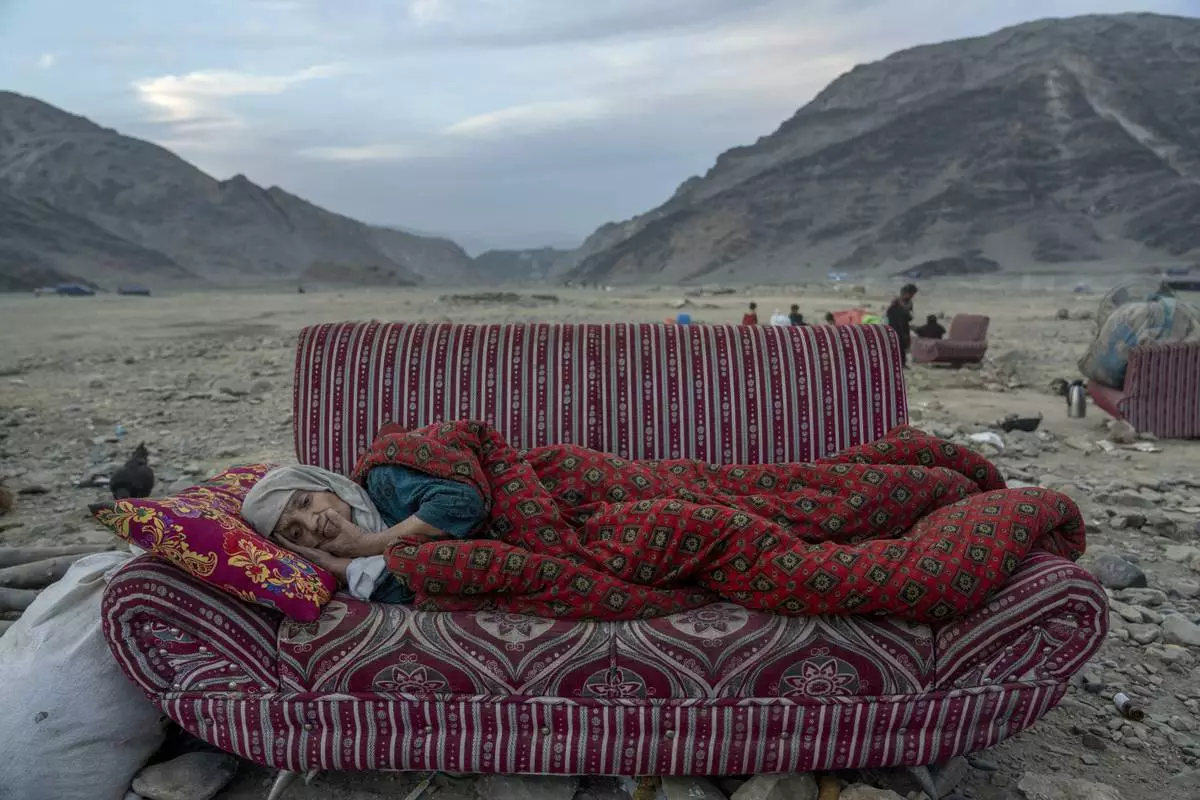
This image provided by World Press Photo is part of a series titled Afghanistan on the Edge by Ebrahim Noroozi, Associated Press, which won the World Press Photo Asia Series category and showsAn Afghan refugee rests in the desert next to a camp near the Torkham Pakistan-Afghanistan border, in Torkham, Afghanistan, Friday, Nov. 17, 2023. A huge number of Afghans refugees entered the Torkham border to return home hours before the expiration of a Pakistani government deadline for those who are in the country illegally to leave or face deportation. (AP Photo/Ebrahim Noroozi)
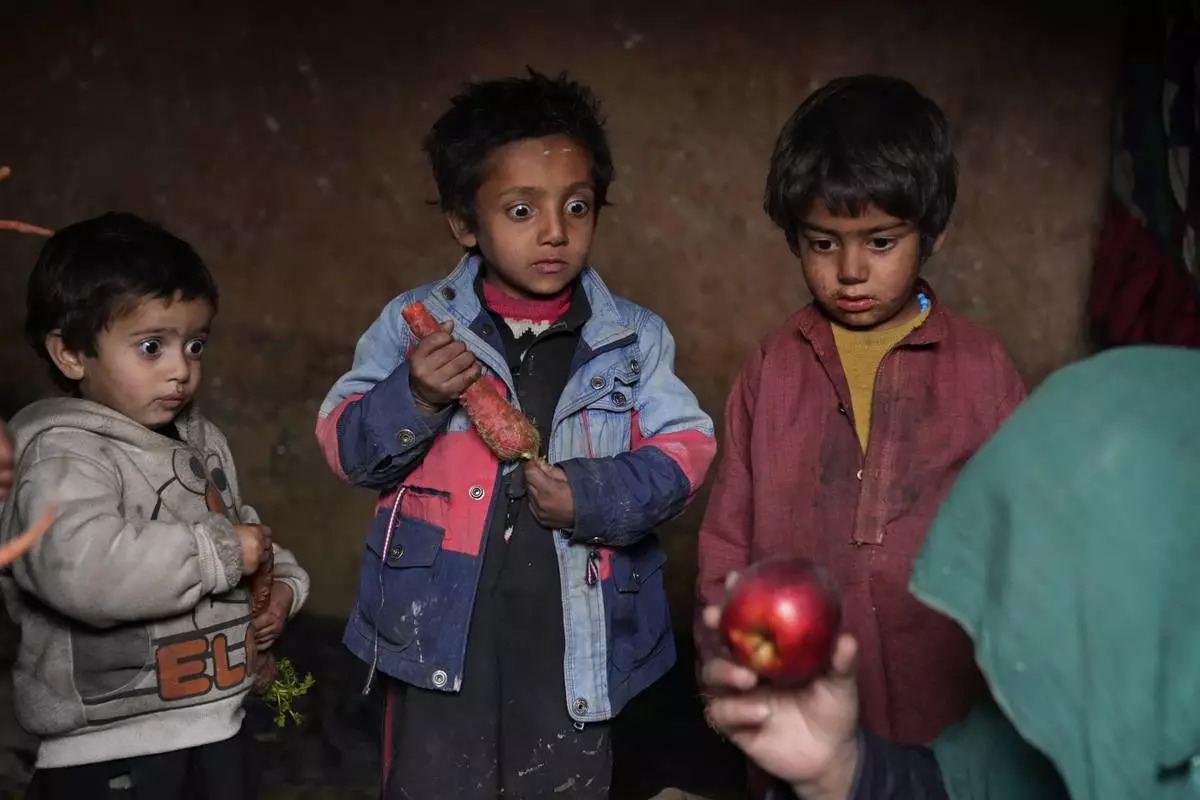
This image provided by World Press Photo is part of a series titled Afghanistan on the Edge by Ebrahim Noroozi, Associated Press, which won the World Press Photo Asia Series category and shows : Since the chaotic Taliban takeover of Kabul on Aug. 15, 2021, an already war-devastated economy once kept alive by international donations alone is now on the verge of collapse. There isn't enough money for hospitals. The World Health Organization is warning of millions of children suffering malnutrition, and the U.N. says 97% of Afghans will soon be living below the poverty line. Three Afghan internally displaced children look with surprise at an apple that their mother brought home after begging, in a camp on the outskirts of Kabul, Afghanistan, Thursday, Feb 2, 2023. (AP Photo/Ebrahim Noroozi)
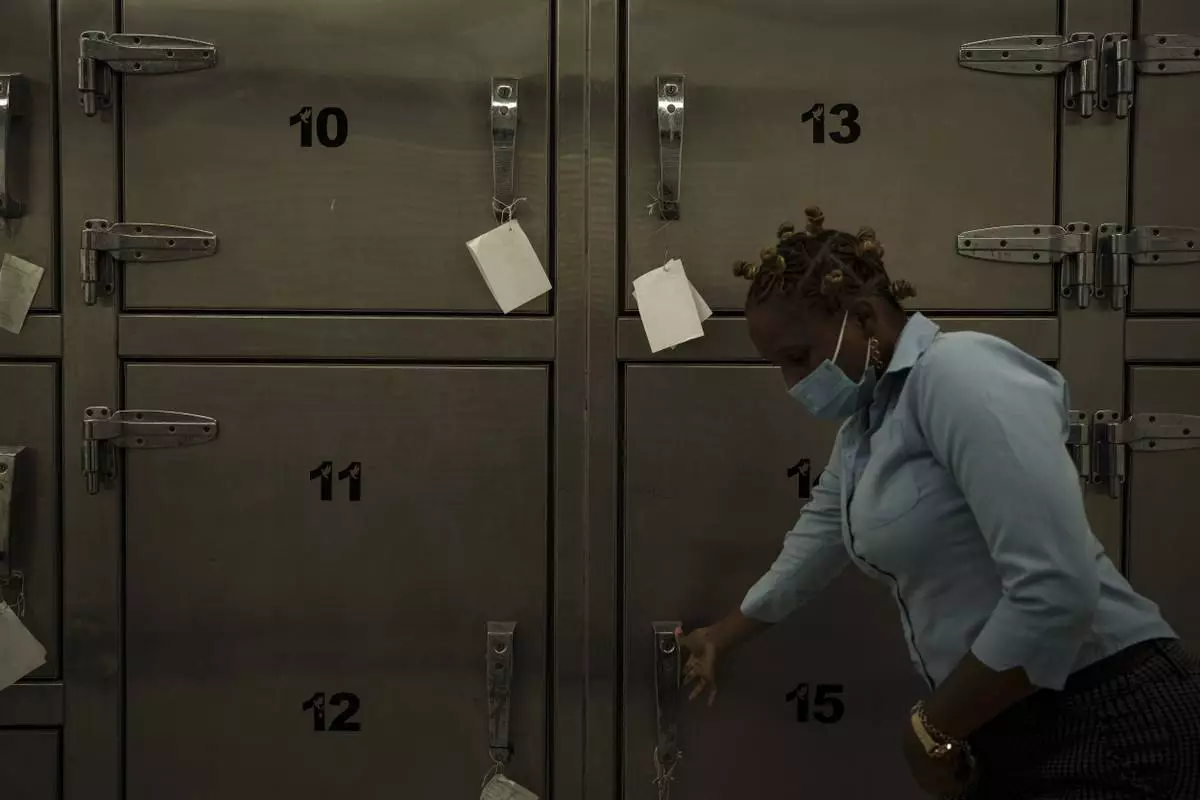
This image provided by World Press Photo is part of a multimedia project by Associated Press' Renata Brito and Felipe Dana titled Adrift, won the World Press Photo Africa Regional Winner Open Format category and shows a mortuary technician opening the door of a refrigerator used to store the remains of migrants recovered from inside the Mauritania boat that appeared drifting near the island of Tobago, in Scarborough, Trinidad and Tobago, Tuesday, Jan. 25, 2022. In May 2021 a boat from Mauritania full of dead men was found off the coast of the Caribbean Island of Tobago. Who were these men and why were they on the other side of the Atlantic Ocean? Two visual journalists sought answers, uncovering a story about migrants from West Africa who seek opportunity in Europe via an increasingly popular but treacherous Atlantic route. (AP Photo/Felipe Dana)
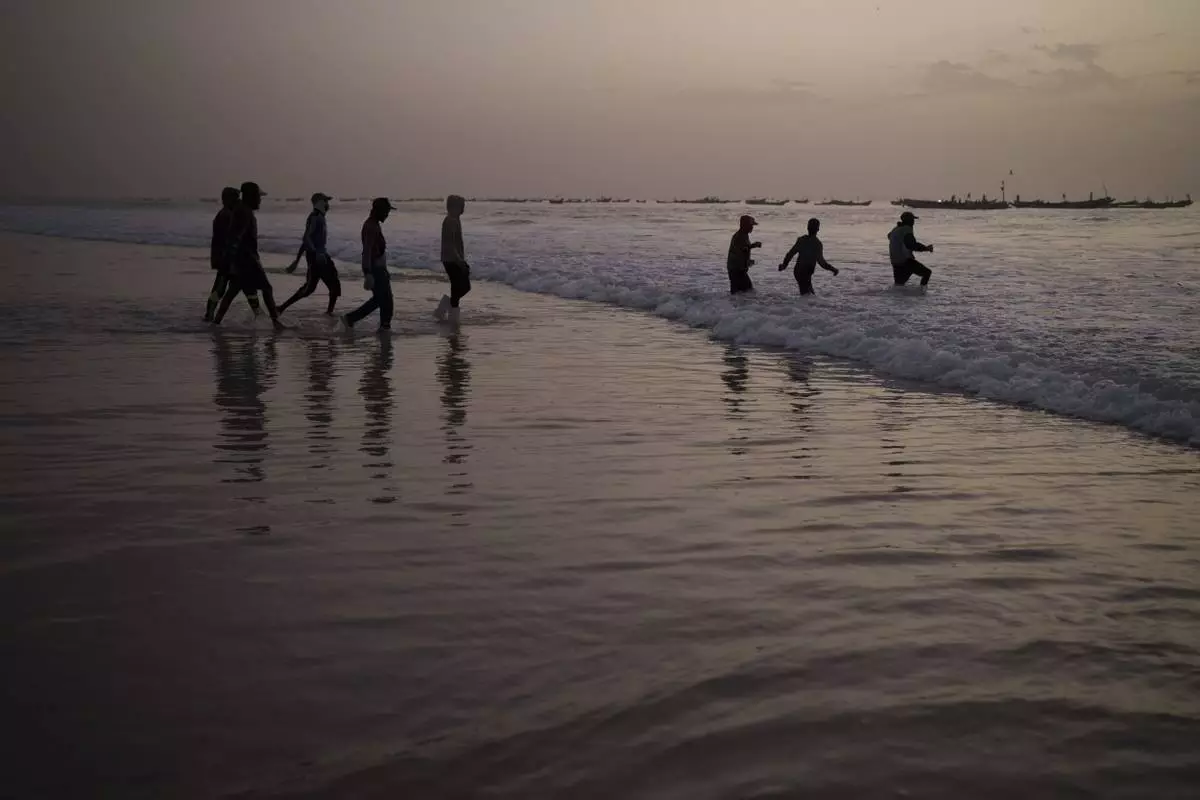
This image provided by World Press Photo is part of a multimedia project by Associated Press' Renata Brito and Felipe Dana titled Adrift, won the World Press Photo Africa Regional Winner Open Format category and shows young fishermen walk into the ocean to board an artisanal fishing boat in Nouakchott, Mauritania, Friday, Dec. 10, 2021. In May 2021 a boat from Mauritania full of dead men was found off the coast of the Caribbean Island of Tobago. Who were these men and why were they on the other side of the Atlantic Ocean? Two visual journalists sought answers, uncovering a story about migrants from West Africa who seek opportunity in Europe via an increasingly popular but treacherous Atlantic route. (AP Photo/Felipe Dana)

This image provided by World Press Photo is part of a multimedia project by Associated Press' Renata Brito and Felipe Dana titled Adrift, won the World Press Photo Africa Regional Winner Open Format category and shows Moussa Sako, an asylum-seeker from Mali, who survived 22 days aboard a Mauritanian boat drifting in the Atlantic Ocean covers his face during an interview with the Associated Press in Guadalajara, Spain, Sunday, Nov. 14, 2021. In May 2021 a boat from Mauritania full of dead men was found off the coast of the Caribbean Island of Tobago. Who were these men and why were they on the other side of the Atlantic Ocean? Two visual journalists sought answers, uncovering a story about migrants from West Africa who seek opportunity in Europe via an increasingly popular but treacherous Atlantic route. (AP Photo/Felipe Dana)

This image provided by World Press Photo and taken by Julia Kochetova is part of a series titled War is Personal which won the World Press Photo Open Format Award. Amidst tens of thousands of civilian and military casualties and an effective stalemate that has lasted for months, there are no signs of peace on the horizon for Russia's war in Ukraine. While news media updates its audience with statistics and maps, and international attention drifts elsewhere, the photographer has created a personal website that brings together photojournalism with the personal documentary style of a diary to show the world what it is like to live with war as an everyday reality. (Julia Kochetova/World Press Photo via AP)
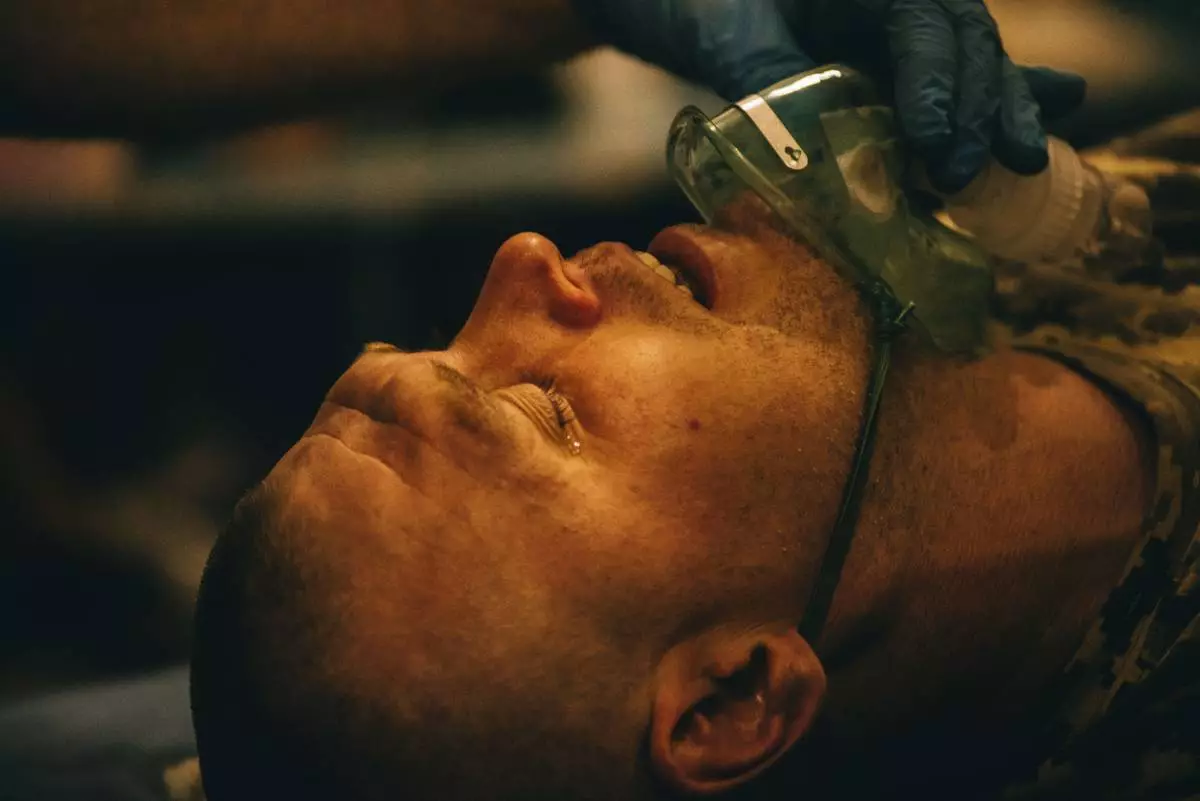
This image provided by World Press Photo and taken by Julia Kochetova is part of a series titled War is Personal which won the World Press Photo Open Format Award and shows a stabilization point near Bakhmut, Ukraine, of the 5th assault brigade and 77th brigade. Hospitalliers battalion - volunteer battalion of combat medics are helping here. Amidst tens of thousands of civilian and military casualties and an effective stalemate that has lasted for months, there are no signs of peace on the horizon for Russia's war in Ukraine. While news media updates its audience with statistics and maps, and international attention drifts elsewhere, the photographer has created a personal website that brings together photojournalism with the personal documentary style of a diary to show the world what it is like to live with war as an everyday reality. (Julia Kochetova/Der Spiegel/World Press Photo via AP)
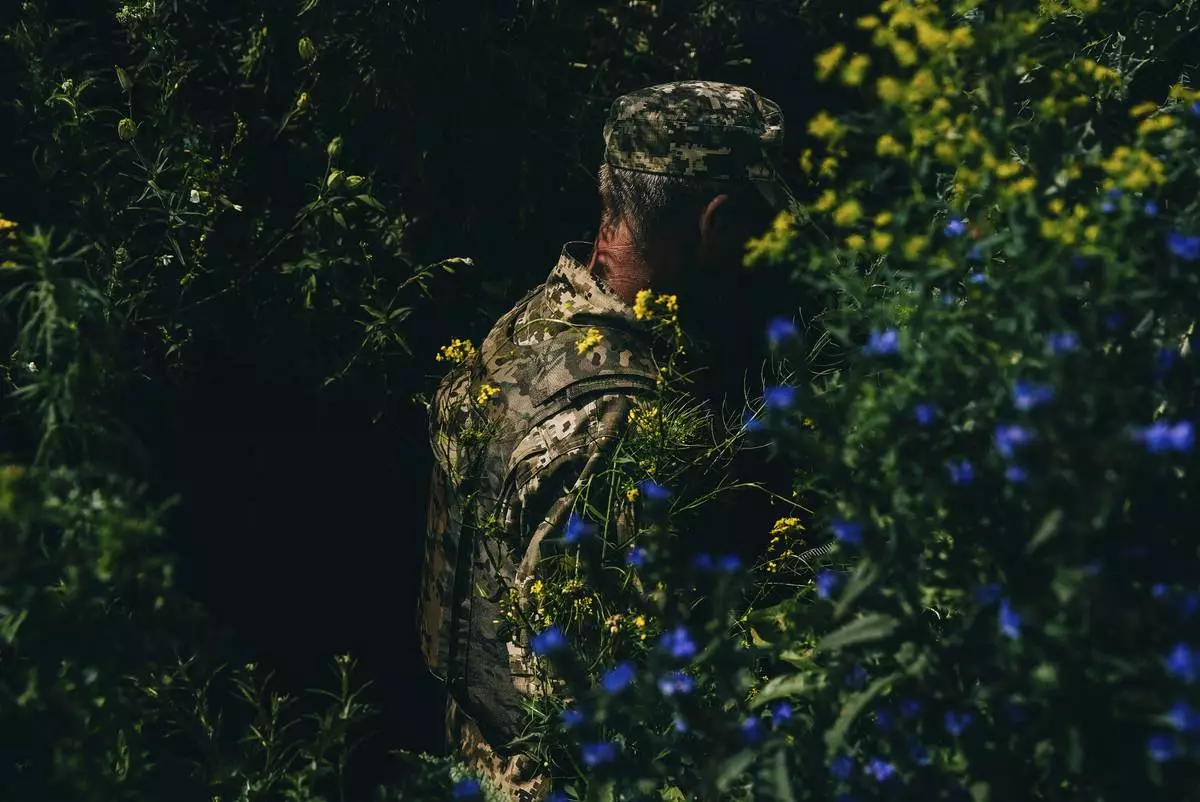
This image provided by World Press Photo and taken by Julia Kochetova is part of a series titled War is Personal which won the World Press Photo Open Format Award and shows the training of mobilized conscripts of 68th brigade in Donetsk region, not far from frontline. 68th brigade recently liberated Blagodatne village during the Ukrainian counter-offensive. The instructors came from US, working for NGO "Saber".Amidst tens of thousands of civilian and military casualties and an effective stalemate that has lasted for months, there are no signs of peace on the horizon for Russia's war in Ukraine. While news media updates its audience with statistics and maps, and international attention drifts elsewhere, the photographer has created a personal website that brings together photojournalism with the personal documentary style of a diary to show the world what it is like to live with war as an everyday reality. (Julia Kochetova/Der Spiegel/World Press Photo via AP)
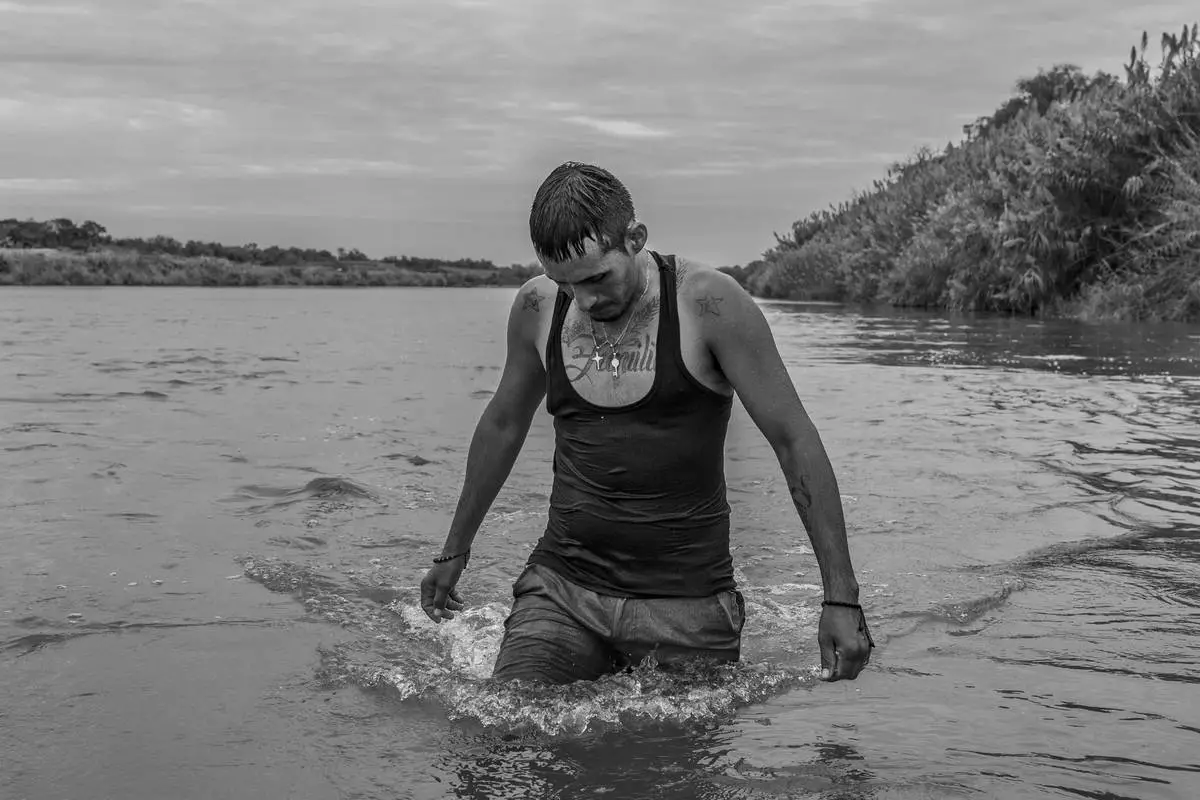
This image provided by World Press Photo and taken by Alejandro Cegarra for The New Times/Bloomberg is part of a series titled The Two Walls which won the World Press Photo Long-Term Project Award and shows Carlos Mendoza, a Venezuelan migrant, crossing the Rio Grande river to seek asylum in the United States. Piedras Negras, Mexico, 7 October 2023. (Alejandro Cegarra/The New York Times/Bloomberg/World Press Photo via AP)
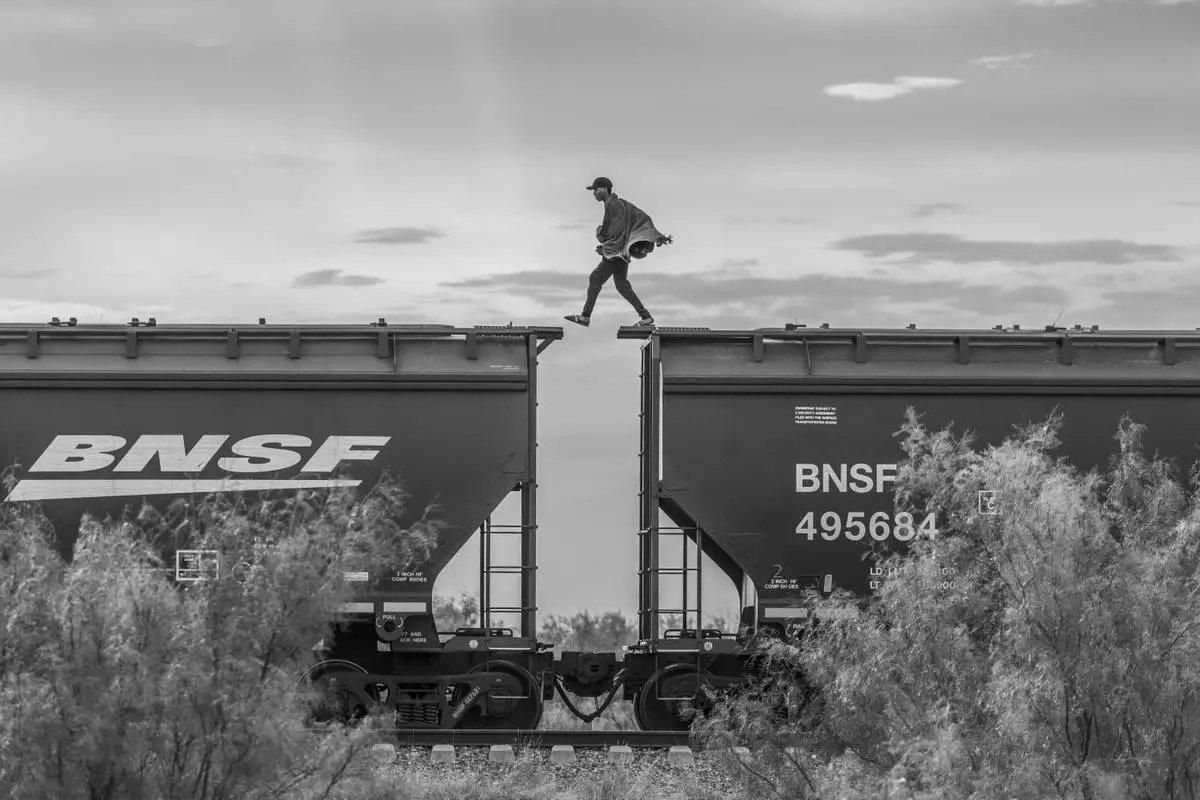
This image provided by World Press Photo and taken by Alejandro Cegarra for The New Times/Bloomberg is part of a series titled The Two Walls which won the World Press Photo Long-Term Project Award and shows a migrant walking atop a freight train known as "The Beast." Migrants and asylum seekers lacking the financial resources to pay a smuggler often resort to using cargo trains to reach the United States border. This mode of transportation is very dangerous; over the years, hundreds have fallen onto the tracks and have been killed or maimed. Piedras Negras, Mexico, 8 October 2023. (Alejandro Cegarra/The New York Times/Bloomberg/World Press Photo via AP)
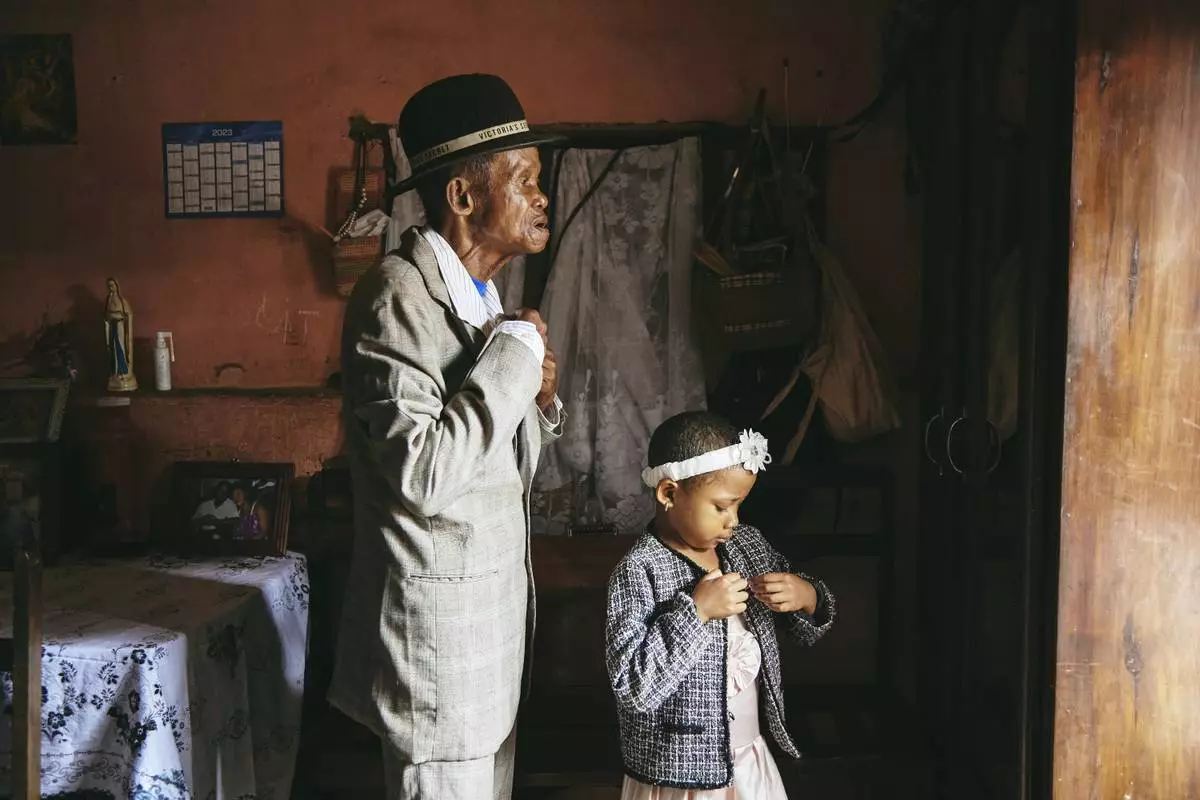
This image provided by World Press Photo and taken by Lee-Ann Olwage for GEO is part of a series titled Valim-babena which won the World Press Photo Story of the Year Award and shows Dada Paul Rakotazandriny (91), who is living with dementia, and his granddaughter, Odliatemix Rafaraniriana (5), get ready for church on Sunday morning at his home in Antananarivo, Madagascar. 12 March 2023. (Lee-Ann Olwage/Geo/World Press Photo via AP)
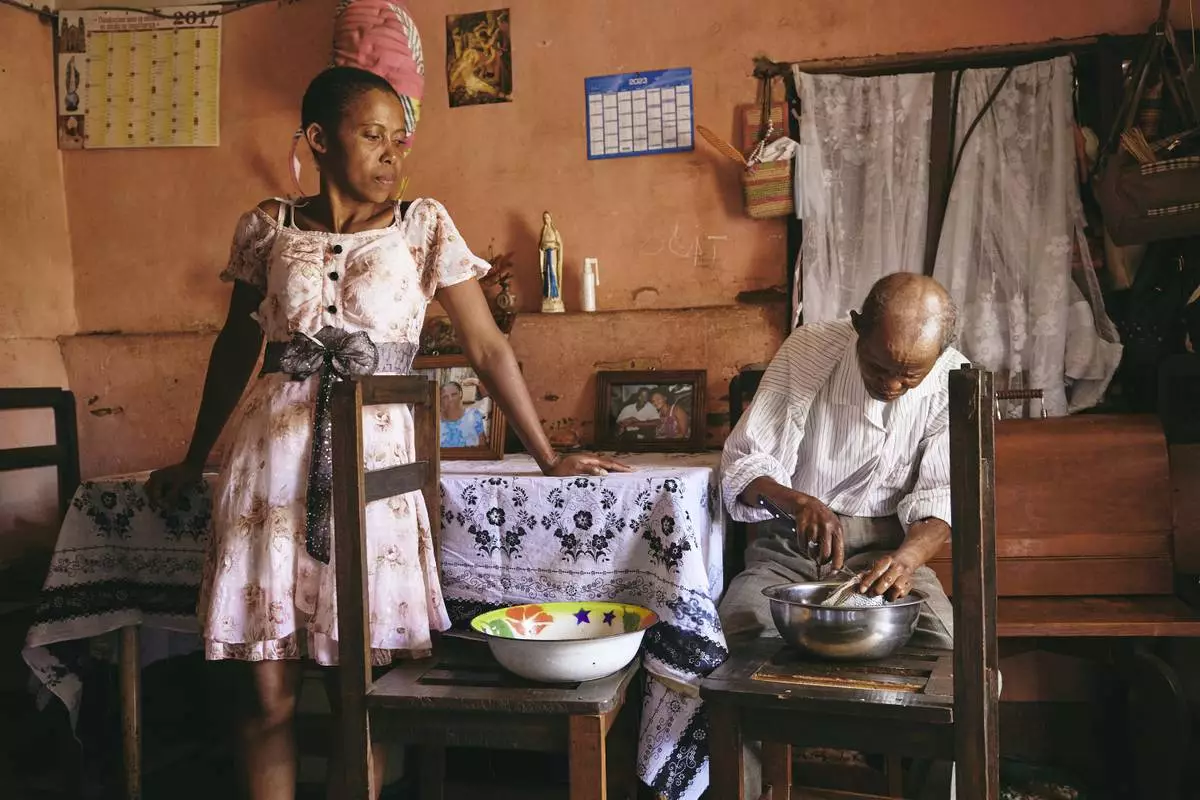
This image provided by World Press Photo and taken by Lee-Ann Olwage for GEO is part of a series titled Valim-babena which won the World Press Photo Story of the Year Award and shows Joeline (Fara) Rafaraniriana (41) watches her father, Dada Paul Rakotazandriny (91) clean fish at home on Sunday afternoon. A typical Sunday consists of the family attending church in the morning and spending time together in the afternoon. Fara works during the week and as the sole provider and carer for her daughter and father struggles to manage all her responsibilities in the absence of assistance by her siblings who live close by. Mandrosoa Ivato, Antananarivo, Madagascar. 12 March 2023. (Lee-Ann Olwage/Geo/World Press Photo via AP)
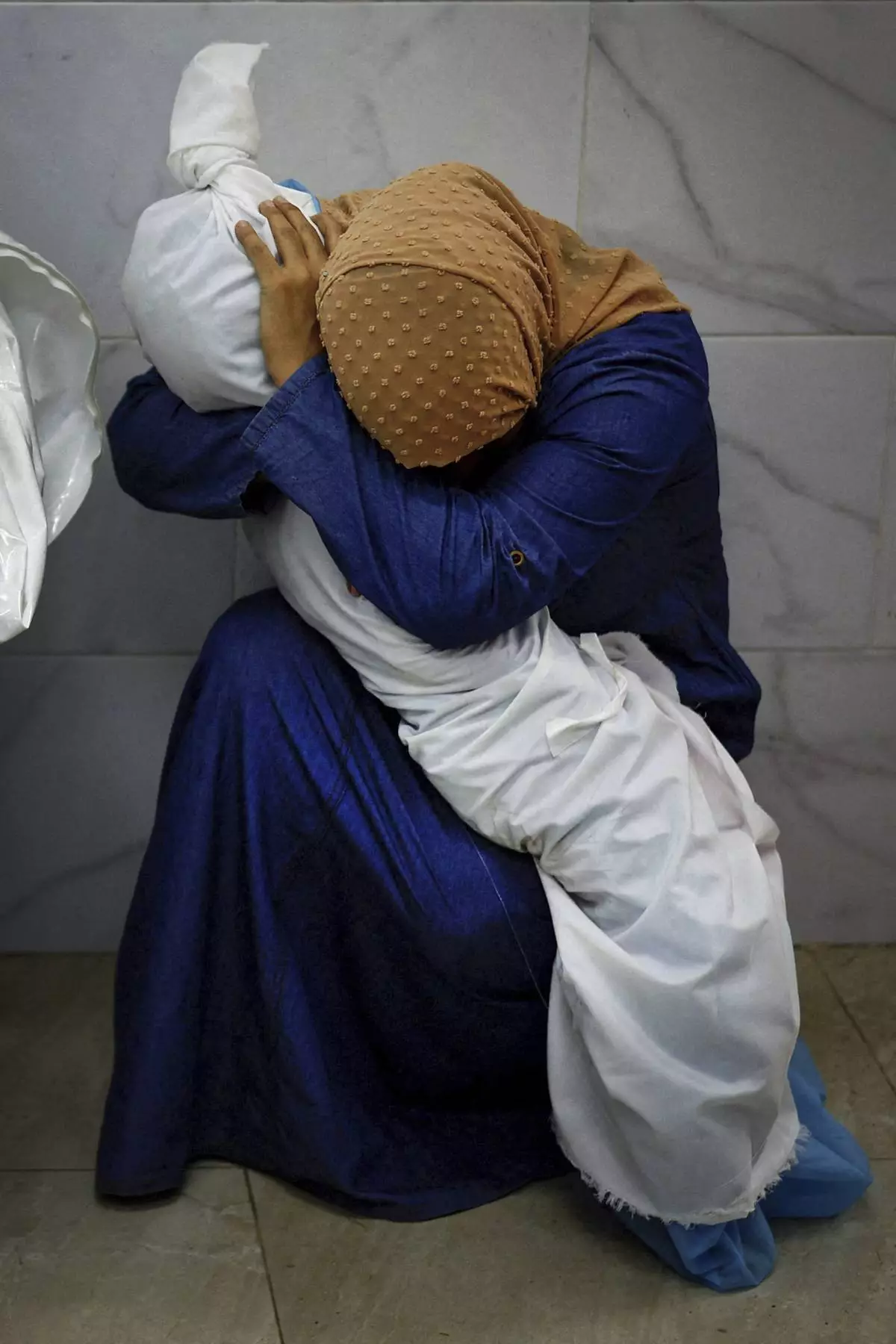
This image provided by World Press Photo and taken by Mohammed Salem of the Reuters news agency won the World Press Photo Award of the Year and shows Palestinian woman Inas Abu Maamar, 36, embracing the body of her 5-year-old niece Saly, who was killed in an Israeli strike, at Nasser hospital in Khan Younis in the southern Gaza Strip, October 17, 2023. (Mohammed Salem/Reuters/World Press Photo via AP)

























